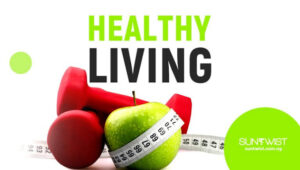
Healthy living is not only beneficial for your personal health, but also for the health of your family, community, and the environment. According to the World Health Organization (WHO), healthy living can help prevent and control many noncommunicable diseases (NCDs), such as diabetes, heart disease, stroke, and cancer. These diseases are responsible for 71% of all deaths globally, and many of them are linked to modifiable risk factors, such as unhealthy diet, physical inactivity, tobacco use, and alcohol consumption.
Healthy living can also improve your mental health, which is essential for your overall well-being. Mental health refers to your emotional, psychological, and social well-being. It affects how you think, feel, and act. It also determines how you handle stress, relate to others, and make choices . Mental health problems are common and can affect anyone, regardless of age, gender, culture, or background. Some of the most prevalent mental health conditions are depression, anxiety, bipolar disorder, schizophrenia, and dementia . Mental health problems can have serious consequences for individuals and society, such as reduced quality of life, impaired functioning, increased morbidity and mortality, social isolation, stigma, and discrimination .
Healthy living can also have positive impacts on the environment. For example, by choosing more plant-based foods and less animal products, you can reduce your greenhouse gas emissions, water consumption, land use, and deforestation . By walking or cycling instead of driving or taking public transport, you can reduce your carbon footprint, air pollution, noise pollution, and traffic congestion . By avoiding or minimizing the use of plastic and other disposable items, you can reduce your waste generation, resource depletion, and environmental contamination .
How to live a healthier life?
There is no one-size-fits-all formula for healthy living. However, there are some general principles and guidelines that can help you make healthier choices in different aspects of your life. Here are some tips to live a healthier life:
Eat a balanced diet
A balanced diet is one that provides your body with the nutrients it needs to function properly. It should include a variety of foods from different food groups: fruits and vegetables; grains; protein sources; dairy products or alternatives; and healthy fats . A balanced diet should also limit the intake of salt, sugar, saturated fats, trans fats, and processed foods .
Some benefits of eating a balanced diet are:
- It can help you maintain a healthy weight and prevent obesity .
- It can lower your risk of developing NCDs such as diabetes, heart disease, stroke, and cancer .
- It can boost your immune system and protect you from infections .
- It can improve your mood and cognitive function .
Some tips to eat a balanced diet are:
- Eat at least five portions (400g) of fruits and vegetables per day .
- Choose whole grains over refined grains .
- Opt for lean protein sources such as fish, poultry, eggs, legumes, nuts, and seeds .
- Consume low-fat or fat-free dairy products or alternatives .
- Use unsaturated fats such as olive oil, canola oil, sunflower oil, avocado, and nuts instead of saturated fats such as butter, palm oil, coconut oil, cream, cheese, and lard .
- Avoid trans fats found in baked and fried foods, pre-packaged snacks, and fast foods .
- Limit your salt intake to less than 5g per day (equivalent to one teaspoon) .
- Limit your sugar intake to less than 10% of your total energy intake (equivalent to 50g or 12 teaspoons for an adult) .
- Drink plenty of water and avoid sugary drinks such as soda, juice, and sports drinks .
Be physically active
Physical activity is any bodily movement that requires energy expenditure. It can include activities such as walking, cycling, dancing, playing sports, gardening, housework, and more. Physical activity can be classified into three types: aerobic (cardiovascular), anaerobic (muscle-strengthening), and flexibility (stretching) [25]. The WHO recommends that adults do at least 150 minutes of moderate-intensity aerobic activity or 75 minutes of vigorous-intensity aerobic activity per week, plus muscle-strengthening activities on two or more days per week .
Some benefits of being physically active are:
- It can help you burn calories and maintain a healthy weight .
- It can strengthen your heart, lungs, blood vessels, bones, and muscles .
- It can lower your blood pressure, cholesterol, blood sugar, and inflammation .
- It can reduce your risk of developing NCDs such as diabetes, heart disease, stroke, and cancer .
- It can improve your mood and mental health .
- It can enhance your cognition and memory .
Some tips to be physically active are:
- Find an activity that you enjoy and that suits your level of fitness and ability .
- Set realistic and specific goals and track your progress .
- Start slowly and gradually increase the intensity, duration, and frequency of your activity .
- Warm up before and cool down after your activity .
- Wear comfortable and appropriate clothing and footwear .
- Stay hydrated and replenish your energy with healthy snacks .
- Listen to your body and rest when needed .
- Seek medical advice if you have any health conditions or concerns .
Avoid harmful substances
Harmful substances are those that can damage your health and well-being when consumed or exposed to. They can include tobacco, alcohol, drugs, pollutants, and toxins. Harmful substances can affect your body in various ways, such as impairing your organs, systems, and functions; altering your mood, behavior, and cognition; increasing your risk of developing NCDs and infectious diseases; and causing addiction and dependence [41].
Some benefits of avoiding harmful substances are:
- It can improve your respiratory health and reduce your risk of lung cancer and chronic obstructive pulmonary disease (COPD) [42].
- It can improve your cardiovascular health and reduce your risk of heart disease and stroke [43].
- It can improve your liver health and reduce your risk of liver cirrhosis and liver cancer [44].
- It can improve your mental health and reduce your risk of depression, anxiety, psychosis, and suicide [45].
- It can improve your reproductive health and reduce your risk of infertility, impotence, miscarriage, birth defects, and sexually transmitted infections (STIs) [46].
Some tips to avoid harmful substances are:
- Quit smoking or using tobacco products. If you need help, seek professional support or use nicotine replacement therapy (NRT) or other approved medications [47].
- Limit or abstain from drinking alcohol. If you choose to drink, do so in moderation (no more than one drink per day for women and two drinks per day for men) and avoid binge drinking (more than four drinks in two hours for women and five drinks in two hours for men) [48].
- Avoid using illicit drugs or misusing prescription drugs. If you have a substance use disorder, seek treatment or join a support group [49].
- Avoid exposure to air pollution, secondhand smoke, radon, asbestos, lead, mercury, pesticides, and other environmental hazards. Use protective equipment, ventilation, filtration, or purification systems when necessary [50].
Manage stress
Stress is a normal response to challenging or threatening situations. It can help you cope with difficulties and motivate you to perform better. However, too much stress or chronic stress can have negative effects on your health and well-being. Stress can affect your body by causing headaches, muscle tension, fatigue, insomnia, digestive problems, high blood pressure, heart problems, weakened immunity, and more. Stress can also affect your mind by causing irritability, anxiety, depression, anger, mood swings, memory problems, concentration difficulties, and more. Stress can also affect your behavior by causing overeating or undereating, smoking or drinking more, withdrawing from others, neglecting responsibilities, and more [51].
Some benefits of managing stress are:
- It can improve your physical health and prevent or reduce the symptoms of stress-related diseases [52].
- It can improve your mental health and prevent or reduce the symptoms of stress-related disorders [53].
- It can improve your emotional well-being and enhance your happiness and satisfaction with life [54].
- It can improve your social well-being and strengthen your relationships with others [55].
Some tips to manage stress are:
- Identify the sources of stress in your life and try to eliminate or reduce them if possible [56].
- Practice relaxation techniques such as deep breathing, meditation, yoga, tai chi, massage, aromatherapy, music therapy, or art therapy [57].
- Engage in physical activity regularly to release endorphins (the feel-good hormones) and reduce cortisol (the stress hormone) levels in your body [58].


